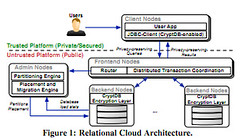
The Relational Cloud Project is an effort by a group of researchers at MIT to investigate technologies and challenges related to Database-as-a-Service within cloud-computing. They are trying to figure out how the advantages of the DaaS (Database-as-a-Service) model, that we've seen arise in other areas like OLAP and NoSQL, can be applied to relational databases. The DaaS advantages as they see them are: 1) predictable costs, proportional to the quality of service and actual workloads, 2) lower technical complexity, thanks to a unified and simplified service access interface, and 3) virtually infinite resources ready at hand. An interesting description of their approach is explained in the paper Relational Cloud: A Database-as-a-Service for the Cloud. From the abstract:
This paper introduces a new transactional “database-as-a-service” (DBaaS) called Relational Cloud. A DBaaS promises to move much of the operational burden of provisioning, configuration, scaling, performance tuning, backup, privacy, and access control from the database users to the service operator, offering lower overall costs to users. Early DBaaS efforts include Amazon RDS and Microsoft SQL Azure, which are promising in terms of establishing the market need for such a service, but which do not address three important challenges: efficient multi-tenancy, elastic scalability, and database privacy. We argue that these three challenges must be overcome before outsourcing database software and management becomes attractive to many users, and cost-effective for service providers. The key technical features of Relational Cloud include: (1) a workload-aware approach to multi-tenancy that identifies the workloads that can be co-located on a database server, achieving higher consolidation and better performance than existing approaches; (2) the use of a graph-based data partitioning algorithm to achieve near-linear elastic scale-out even for complex transactional workloads; and (3) an adjustable security scheme that enables SQL queries to run over encrypted data, including ordering operations, aggregates, and joins. An underlying theme in the design of the components of Relational Cloud is the notion of workload awareness: by monitoring query patterns and data accesses, the system obtains information useful for various optimization and security functions, reducing the configuration effort for users and operators.
Related Articles
- Relational Cloud Project
- Relevant Literature
- Schism: a Workload-Driven Approach to Database Replication and Partitioning
- Relational Cloud: The Case for a Database Service